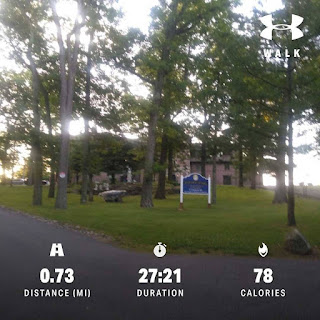Walking History
I took this photo as I climbed up a
hill this. I was almost at a mile and I hoped to walk at four this
morning. However, shortly after I took this, the app stopped
working. The minutes continued to tick off, but the distance did not.
I stopped the app. I restarted. Still nothing. I saved what I
had. I started again, nothing. I restarted my phone and tried the
app again. Still nothing. I kept walking, but as the minutes ticked
off and no distance was shown I got quite frustrated. I like a history of
my walks. I like a complete history, one that is a full record of what I did
and reflects the full picture, or at least as much of the full picture as I can
get.
I've always been fascinated with and liked history, specifically American history. Recently I've come to realize how much of history I DON'T know. History that is important, but has been overlooked and outright ignored. And like my walking history, I find this frustrating.
Perhaps it is silly to compare something as trivial as my walking history to the history of this country, but I believe it makes a point. If you look at what was recorded by my app today, you get a skewed view of what I did. Such is the same when we leave or overlook parts of history, specifically ones that are not "pretty" and make us uncomfortable. But how can we learn from history, if we don't KNOW the full story? It's not erasing history; it's expanding it.
Example, I recently finished You Never Forget Your First: A Biography of George Washington by Alexis Coe. Almost everyone knows the history of the first president, or do they? The biography does not deify the man for all of his great works, but it does bring to light some not so pleasant facts without vilifying him. What this book does do is show the kind of man that he was; both good and bad. History is should not be about gods, but about imperfect human beings. We should not gloss over the sins in order to try and make someone a saint. (Even the most saintly of us have plenty of sins on our soul/conscious.)
This past Friday was Juneteenth, a historical date that I knew, but didn't know. The more I learned about it, the more important it became in my mind. It is an important date in AMERICAN history. As I read from the official site: "Juneteenth is the oldest nationally celebrated commemoration of the ending of slavery in the United States. Dating back to 1865, it was on June 19th that the Union soldiers, led by Major General Gordon Granger, landed at Galveston, Texas with news that the war had ended and that the enslaved were now free. Note that this was two and a half years after President Lincoln’s Emancipation Proclamation - which had become official January 1, 1863. The Emancipation Proclamation had little impact on the Texans due to the minimal number of Union troops to enforce the new Executive Order. However, with the surrender of General Lee in April of 1865, and the arrival of General Granger’s regiment, the forces were finally strong enough to influence and overcome the resistance.
Later attempts to explain this two and a half year delay in the receipt of this important news have yielded several versions that have been handed down through the years. Often told is the story of a messenger who was murdered on his way to Texas with the news of freedom. Another is that the news was deliberately withheld by the enslavers to maintain the labor force on the plantations. And still another is that federal troops actually waited for the slave owners to reap the benefits of one last cotton harvest before going to Texas to enforce the Emancipation Proclamation. All of which, or none of these versions could be true. "
In this age where news is relayed in the blink of an eye, how fascinating (and sorrowful) is it to know that it took two and a half years for the slaves of Galveston to learn that they were free. This important piece of history was not part of my history lessons. Nor was the internment of over 115,000 people from 1942 -1945 (mostly United States Citizens) who's only "crime" was that they were of Japanese descent. (Although I did know a little bit about it from an assignment in my history class on Supreme Court Cases, where I wrote a paper on Korematsu v. United States.) It's not a pretty picture, but it IS part of the history of the United States and needs to be shared.
Those are just two examples...I could go on with so many more. (Perhaps Native American history is the best example of the adage that history is written by the victors.) There is so much HISTORY that is omitted from our textbooks, our curriculums, etc. The story of America does not begin with the Mayflower landing at Plymouth Rock. We need to gather information from ALL walks of American life. We need to see the WHOLE picture and know ALL sides of the story. We need a history that is beautiful and ugly; because that is truth in life.
As for me, despite frustrations, I will continue to track my walking history because it is important to me. Continued learning is important to me too so I will keep on reading and learning about this country's history, the people who made and shaped it (both good and bad). A tale told from just one perspective is not a complete history and a fully shaped and inclusive history is one that we can all learn and grow from.




Comments
Post a Comment